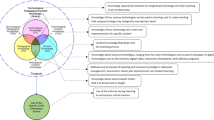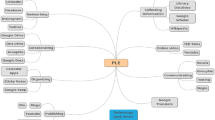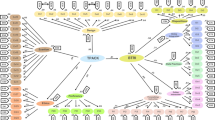Abstract
The development of e-learning and digital campus has prompted more and more teachers to assign online homework to students. Consequently, teachers need to provide sufficient and relevant guidance for such homework. Teachers’ online homework guidance (TOHG) is conceptually connected with their level of technological pedagogical content knowledge about educational use of Web (TPACK-W). This study employed two questionnaires: a self-developed questionnaire for TOHG and a revised TPACK-W questionnaire to study how TOHG is associated with TPACK-W through correlation and regression analysis. Two hundred and eighty-four teacher participants from China who had experience in assigning online homework were asked to complete the questionnaires. This study validated the questionnaires and established significant relationship between the TOHG and TPACK-W. The study expanded current understanding of TPACK through the factors associated with online homework. The findings showed that the level of teachers’ online homework guidance was significantly related to their TPACK-W, and the two factors of Web-Pedagogical Knowledge and Web-Pedagogical-Content Knowledge in the TPACK-W questionnaire could predict the TOHG. Future teachers’ professional development for the construction of TPACK-W should include discussions and guidelines of online homework.
Similar content being viewed by others
References
Archambault, L. M., & Barnett, J. H. (2010). Revisiting technological pedagogical content knowledge: Exploring the TPACK framework. Computers & Education, 55(4), 1656–1662.
Archambault, L., & Crippen, K. (2009). Examining TPACK among K-12 online distance educators in the United States. Contemporary Issues in Technology and Teacher Education, 9(1), 71–88.
Babaali, P., & Gonzalez, L. (2015). A quantitative analysis of the relationship between an online homework system and student achievement in pre-calculus. International Journal of Mathematical Education in Science and Technology, 46(5), 687–699.
Bonham, S. W., Deardorff, D. L., & Beichner, R. J. (2003). Comparison of student performance using web and paper-based homework in college-level physics. Journal of Research in Science Teaching, 40(10), 1050–1071.
Bowie, C. R., Gupta, M., Holshausen, K., Jokic, R., Best, M., & Milev, R. (2013). Cognitive remediation for treatment-resistant depression effects on cognition and functioning and the role of online homework. Journal of Nervous and Mental Disease, 201(8), 680–685.
Cela, K. L., Angel Sicilia, M., & Sanchez, S. (2015). Social network analysis in e-learning environments: A preliminary systematic review. Educational Psychology Review, 27(1), 219–246.
Chai, C. S., Koh, J. H. L., & Tsai, C. (2013). A review of technological pedagogical content knowledge. Educational Technology and Society, 16(2), 31–51.
Chai, C. S., Koh, J. H. L., & Tsai, C.-C. (2016). A review of quantitative measures of Technological Pedagogical Content Knowledge (TPACK). In M. Herring, M. Koehler, & P. Mishra (Eds.), TPACK handbook V2.0: TPACK research and approaches (pp. 87–106). New York: Routledge.
Chai, C. S., Koh, J. H. L., Ho, J., & Tsai, C.-C. (2012). Examining preservice teachers′ perceived knowledge of TPACK and cyberwellness through structural equation modeling. Australasian Journal of Educational Technology, 28(6), 1000–1019.
Demirci, N. (2010). The effect of web-based homework on university students’ physics achievements. Turkish Online Journal of Educational Technology, 9(4), 156–161.
Eichler, J. F., & Peeples, J. (2013). Online homework put to the test: A report on the impact of two online learning systems on student performance in general chemistry. Journal of Chemical Education, 90(9), 1137–1143.
Gonida, E. N., & Cortina, K. S. (2014). Parental involvement in homework: Relations with parent and student achievement-related motivational beliefs and achievement. British Journal of Educational Psychology, 84(3), 376–396.
Hagger, M. S., Sultan, S., Hardcastle, S. J., Reeve, J., Patall, E. A., Fraser, B., et al. (2016). Applying the integrated trans-contextual model to mathematics activities in the classroom and homework behavior and attainment. Learning and Individual Differences, 45, 166–175.
Javier Murillo, F., & Martinez-Garrido, C. (2013). Homework influence on academic performance. A study of Iberoamerican students of primary education. Revista De Psicodidactica, 18(1), 157–178.
Katz, I., Kaplan, A., & Buzukashvily, T. (2011). The role of parents’ motivation in students’ autonomous motivation for doing homework. Learning and Individual Differences, 21(4), 376–386.
Kavanoz, S., Yuksel, H. G., & Ozcan, E. (2015). Pre-service teachers’ self-efficacy perceptions on web pedagogical content knowledge. Computers & Education, 85, 94–101.
Kim, E., & Yang, S. (2016). Internet literacy and digital natives’ civic engagement: Internet skill literacy or Internet information literacy? Journal of Youth Studies, 19(4), 438–456.
Koehler, M. J., Mishra, P., Kereluik, K., Shin, T. S., & Graham, C. R. (2014). The technological pedagogical content knowledge framework. In Handbook of Research on Educational Communications and Technology (pp. 101–111). New York: Springer.
Koh, J., Chai, C. S., & Lee, M. H. (2015). Technological pedagogical content knowledge (TPACK) for pedagogical improvement: Editorial for special issue on TPACK. Asia-Pacific Education Researcher, 24(3SI), 459–462.
Kopcha, T. J., Ottenbreit-Leftwich, A., Jung, J., & Baser, D. (2014). Examining the TPACK framework through the convergent and discriminant validity of two measures. Computers & Education, 78, 87–96.
Kozlov, M. D., & Grosse, C. S. (2016). Online collaborative learning in dyads: Effects of knowledge distribution and awareness. Computers in Human Behavior, 59, 389–401.
Law, K. M. Y., Lee, V. C. S., & Yu, Y. T. (2010). Learning motivation in e-learning facilitated computer programming courses. Computers & Education, 55(1), 218–228.
Lee, M., & Tsai, C. (2010). Exploring teachers’ perceived self efficacy and technological pedagogical content knowledge with respect to educational use of the World Wide Web. Instructional Science, 38(1), 1–21.
Leung, L., & Lee, P. S. N. (2012). Impact of Internet literacy, Internet addiction symptoms, and Internet activities on academic performance. Social Science Computer Review, 30(4), 403–418.
Malik, K., Martinez, N., Romero, J., Schubel, S., & Janowicz, P. A. (2014). Mixed-methods study of online and written organic chemistry homework. Journal of Chemical Education, 91(11), 1804–1809.
Mishra, P., & Koehler, M. J. (2006). Technological pedagogical content knowledge: A framework for teacher knowledge. Teachers College Record, 108(6), 1017–1054.
Parker, L. L., & Loudon, G. M. (2013). Case study using online homework in undergraduate organic chemistry: Results and student attitudes. Journal of Chemical Education, 90(1), 37–44.
Perdian, D. C. (2013). Early identification of student performance and effort using an online homework system: A pilot study. Journal of Science Education and Technology, 22(5), 697–701.
Radovanovic, J., & Slisko, J. (2014). Introducing self-regulated learning into early physics teaching in serbia: Design, initial implementation and evaluation of a multi-stage sequence of homework and classwork. Journal of Baltic Science Education, 13(3), 411–424.
Richards-Babb, M., & Jackson, J. K. (2011). Gendered responses to online homework use in general chemistry. Chemistry Education Research and Practice, 12(4), 409–419.
Roth, V., Ivanchenko, V., & Record, N. (2008). Evaluating student response to WeBWorK, a web-based homework delivery and grading system. Computers & Education, 50(4), 1462–1482.
Shulman, L. (1987). Knowledge and teaching: Foundations of the new reform. Harvard Educational Review, 57(1), 1–23.
Voogt, J., Fisser, P., Roblin, N. P., Tondeur, J., & van Braak, J. (2013). Technological pedagogical content knowledge - a review of the literature. Journal of Computer Assisted Learning, 29(2), 109–121.
Wegmann, E., Stodt, B., & Brand, M. (2015). Addictive use of social networking sites can be explained by the interaction of Internet use expectancies, Internet literacy, and psychopathological symptoms. Journal of Behavioral Addictions, 4(3), 155–162.
Xu, J., Yuan, R., Xu, B., & Xu, M. (2014). Modeling students’ time management in math homework. Learning and Individual Differences, 34, 33–42.
Acknowledgements
We are grateful for the valuable suggestions from Prof. Huang-Yao Hong, Prof. Chun-Ping Zheng, and Miss Meng Li.
Author information
Authors and Affiliations
Corresponding author
Rights and permissions
About this article
Cite this article
Zhou, Y., Chai, C., Liang, JC. et al. The Relationship Between Teachers’ Online Homework Guidance and Technological Pedagogical Content Knowledge about Educational Use of Web. Asia-Pacific Edu Res 26, 239–247 (2017). https://doi.org/10.1007/s40299-017-0344-3
Published:
Issue Date:
DOI: https://doi.org/10.1007/s40299-017-0344-3




